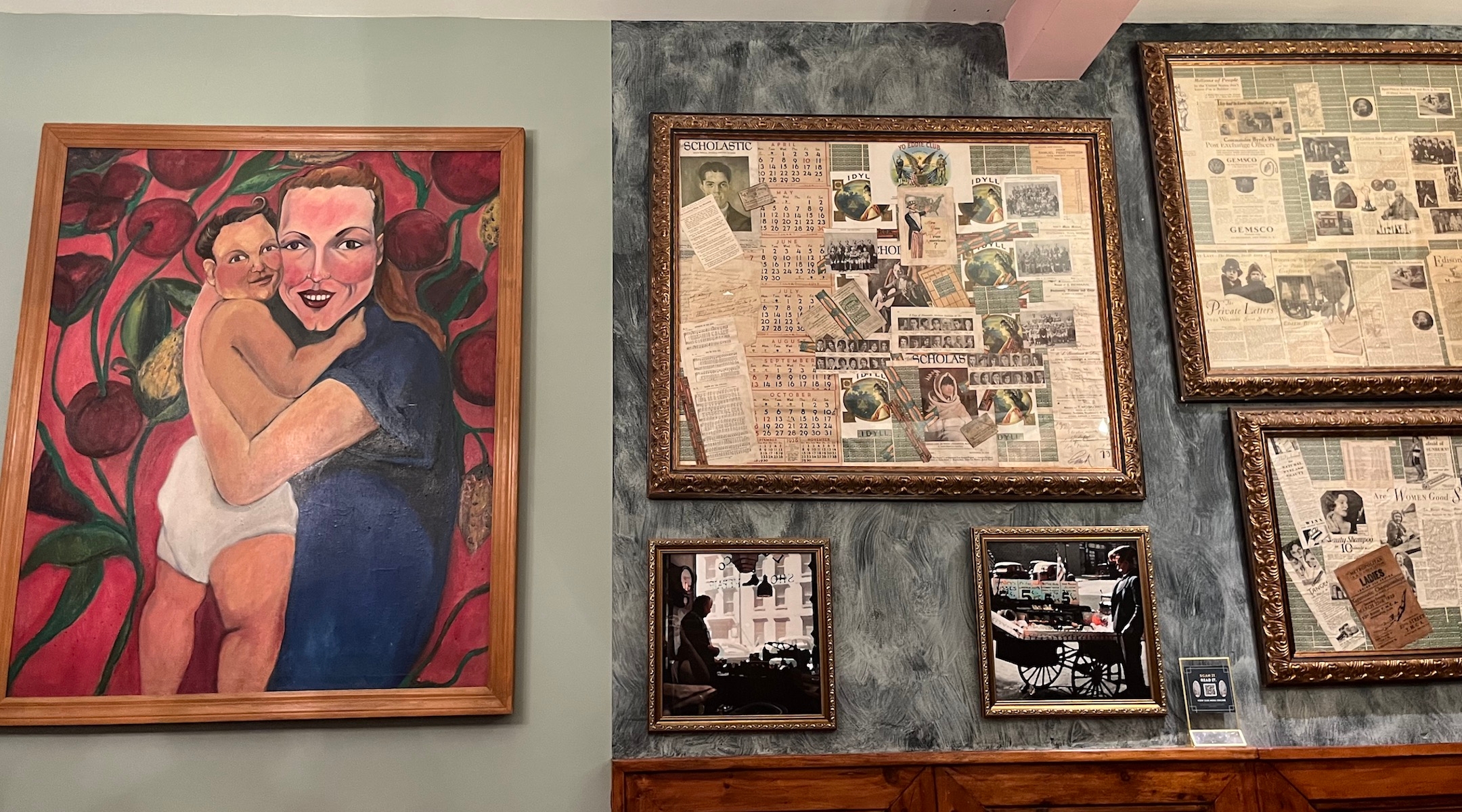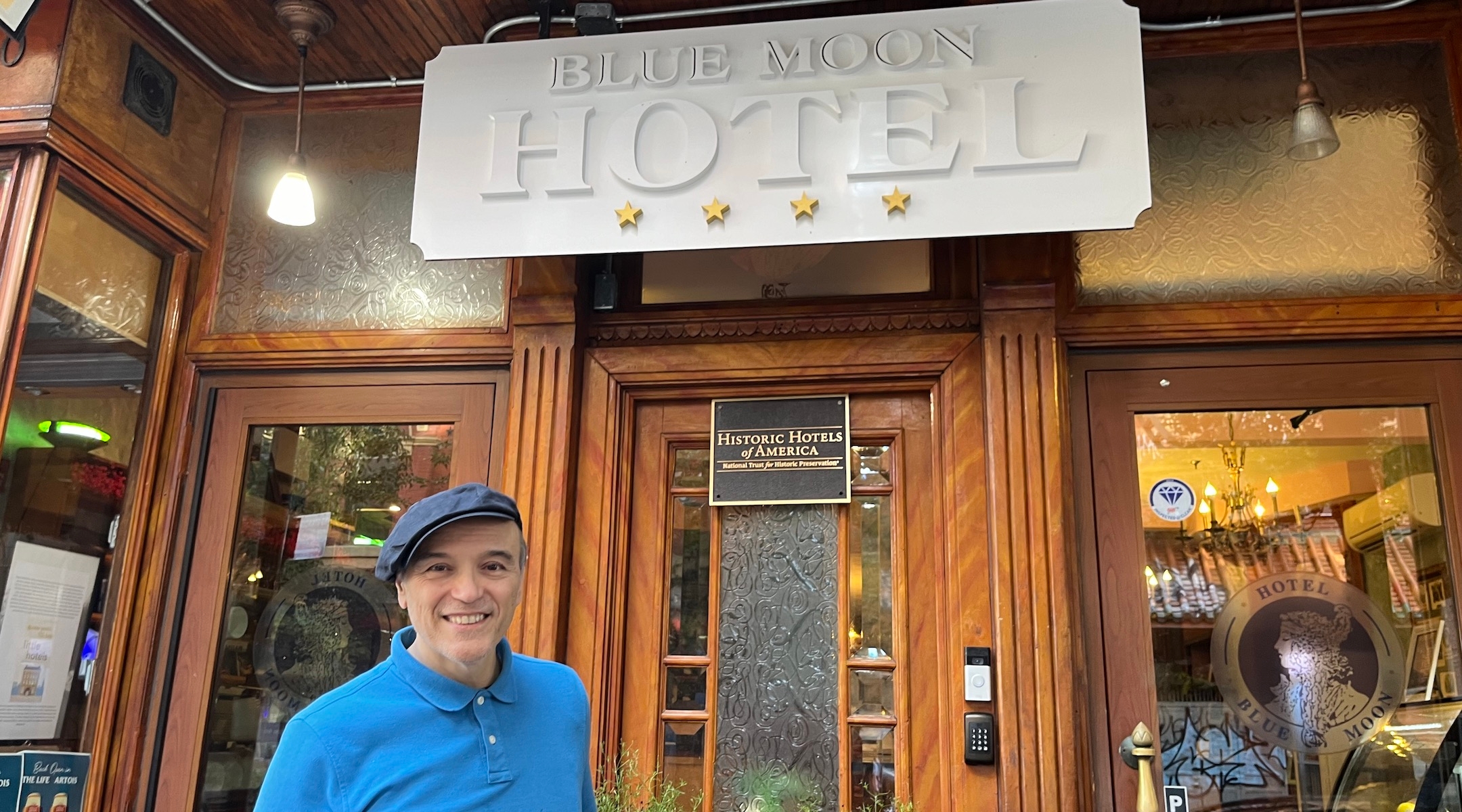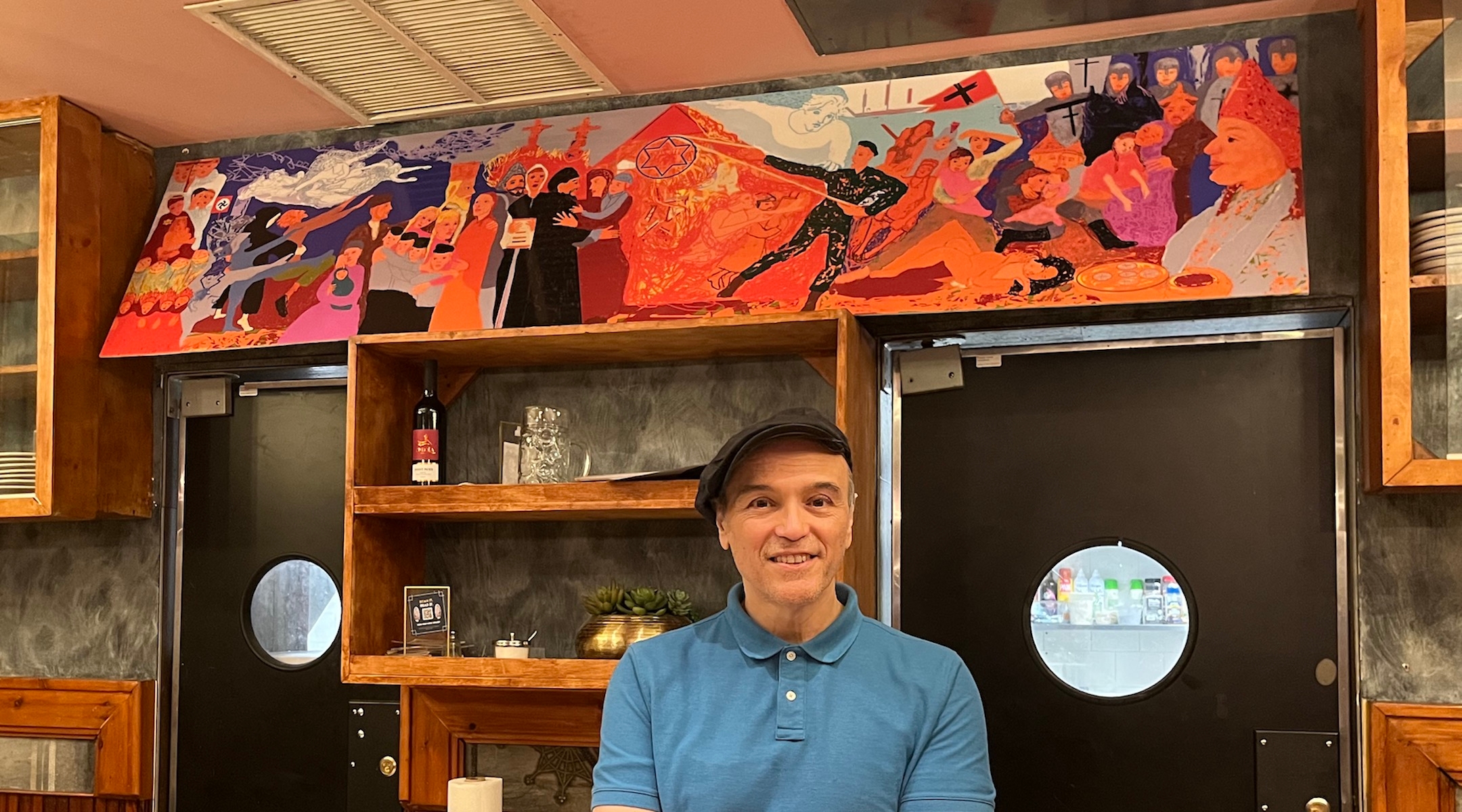Tucked away on a crowded stretch of Orchard Street on New York’s Lower East Side, there’s a kosher Italian restaurant called Sweet Dreams Cafe. Inside, there’s a large-scale painting that depicts the stuff of nightmares: a colorful mural showing 2,000 years of tragedies that have befallen the Jewish people.
The painting, created by Randy Settenbrino, an Orthodox Jewish artist who also owns the cafe, depicts horrors of Jewish history like the Babylonian exile, the auto-da-fés of the Spanish Inquisition and the deadly Nazi regime — including a section that honors his family members who were buried alive in a pogrom.
“I’ve always understood there’s a level of underlying antisemitism in the world,” Settenbrino told the New York Jewish Week last week. “My reaction was always to be more unabashedly and more adamantly Jewish.”

A painting depicting 2,000 years of antisemitism hangs in the lobby dining room of the Blue Moon Hotel. (Courtesy Randy Settenbrino)
That’s not the only art at the Sweet Dreams Cafe. Throughout the eatery, which serves Italian specialties like pasta and panini, dozens of Settenbrino’s paintings adorn the walls, including portraits of his six children as well as biblical figures like Adam and Eve.
The Lower East Side, where hundreds of thousands of Jewish immigrants cycled through in the late 19th and early 20th centuries, has a long, rich legacy of Jewish restaurants, institutions and small business. Survivors include Yonah Schimmel’s Knish Bakery and Katz’s Delicatessen. But even the most jaded New Yorker may be surprised to find a very Jewish endeavor that they probably didn’t know existed on Orchard Street: Not only is there Jewish art tucked away inside a kosher cafe, but the cafe itself is on the ground floor of the Blue Moon Hotel, a tenement building that dates to 1879 and that has been updated and decorated to honor the neighborhood’s Jewish character of yesteryear.
“We are dedicated to Jewish community in every way that we can be,” Settenbrino said while overlooking Orchard Street from the top-floor balcony of the Molly Picon Room, named for the star of Yiddish stage and screen.
Of course, remembering Jewish history doesn’t mean Settenbrino, a vocal supporter of Israel, can escape it, especially in a period of heightened tensions over the war in Gaza. And sure enough, protesters have found out about Settenbrino and his hotel. But more on that in a moment.
Settenbrino has been operating the hotel since 2006, alongside the cafe and art gallery. Each room of the 22-room hotel is named for a different 20th-century entertainment icon, like comedian Eddie Cantor and singer Sophie Tucker. The walls of the hallways and the lobby are decorated with collages of Jewish ephemera and personal effects, from a school boy’s Yiddish homework to posters for Yiddish theater to maps of New York City, as well as historic photos of Lower East Side residents in the 1940s and ’50s by photographer Rebecca Lepkoff.
Before Settenbrino bought the eight-story building, the first-floor storefront was used by merchants who sold bargain wares. The apartments on the upper floors were abandoned and filled with clutter, much of which Settenbrino dug through to make the collages.
“They tell the story of the lives that lived, loved and lost here,” Settenbrino told the New York Jewish Week.
Settenbrino said he renovated the building for five years before he opened in 2006, first clearing out the decades worth of debris, then installing an elevator and renovating the rooms. He installed the original wooden apartment doors, which no longer passed the fire code, as bathroom doors and used the wrought-iron of the former fire escapes to make the balconies.
“He’s done a really remarkable thing, which is to restore this tenement and make it a picture of the community again, and especially with the creation of the kosher Italian restaurant as part of it,” Jason Guberman, the executive director of the American Sephardi Federation and a consultant for the Lower East Side Jewish Conservancy, told the New York Jewish Week.
The job wasn’t an easy one. “To make an old dilapidated tenement into a stately eight-story hotel is like making an ancient woman young and gorgeous when she was not too pretty to begin with,” Settenbrino quipped.

The hotel is decorated with Settenbrino’s paintings and collages of ephemera left behind over the decades by Jewish residents of the tenement building. (Julia Gergely)
Settenbrino, whose father was Italian and his mother a Russian Jew (his parents met at his paternal grandmother’s Italian restaurant in Williamsburg), grew up in Crown Heights, Brooklyn. But he said the Lower East Side, where he attended the Rabbi Jacob Joseph School in the neighborhood in the 1970s, was always a magical place for him.
“I remember the Forverts Building when it was still the Forverts, I remember the Garden Cafeteria when Isaac Bashevis Singer was still alive and he would go down there to eat,” Settenbrino said. “I remember when everybody on the street, every merchant, was a Jew and, and Yiddish was the vernacular and, and there were kosher dairy restaurants everywhere.”
Settenbrino said the Sweet Dreams Cafe — one of the only kosher establishments in the neighborhood — honors that legacy. There, he recreates his Nonna’s recipes. “I’m spiritually Jewish but gastrointestinally Italian,” he joked, adding that providing a kosher dairy option in the neighborhood is part of his mission to preserve the Lower East Side’s old Jewish spirit.

Randy Settenbrino in front of the historic Blue Moon Hotel on the Lower East Side. (Julia Gergely)
At the same time, from his perch on Orchard Street, Settenbrino these days often finds himself contending with very of-the-moment issues: the Israel-Hamas war and the wave of protests and online “activism” that has occurred over the past 10 months.
Settenbrino — who also writes opinion pieces for Israel National News, a right-leaning Israeli news source that’s associated with the religious Zionist movement — said his business and his family have received numerous death threats via phone and email, many of them criticizing his son, Bram, who is an IDF reservist. Sometime last fall, Bram posted videos on his personal Instagram showing the detonation of a shell inside a building in Gaza and as well as footage of seemingly indiscriminate shooting.
Palestinian journalist Younis Tirawi posted about Bram’s actions in July, which was amplified by the Twitter account Stop Arab Hate. On July 21, the account encouraged its followers to boycott the hotel, as well as leave negative reviews online. Some of their followers have taken up the call to action: On Aug. 5, protesters showed up outside of the hotel with fliers and signs encouraging a boycott of the hotel that read “Racist, Islamophobic, Zionist war criminals do not belong in the LES.”
Settenbrino said this week that protesters made an appearance on Sunday and that he expects them to return this week. Stop Arab Hate did not respond to a request for comment.
Settenbrino told the New York Jewish Week that his experience with the protests evokes the type of historic antisemitism that he painted about in the art in his café years ago. “I didn’t have my grandmother’s story, and I hope never to have it,” he said, comparing his maternal grandmother’s family’s experience in a pogrom with what he and his family are enduring now. “So as far as even what we’re going through now, it’s not pleasant, but you have to know how bad it can be.”
Though he’s a passionate supporter of Israel online and in his personal life, inside the hotel and the cafe, there are no obvious allusions to Israel or the war — there are no Israeli flags or hostage posters in the window, for example. Rather, every part of the building connects back to its mission, which is to rejuvenate and memorialize the rich Jewish history of the neighborhood.
“The Lower East Side is the cradle of American Jewish civilization, beginning with the Sephardic refugees from Recife in 1654, and then continuing through the hundreds of thousands who came from Eastern Europe in subsequent years,” said Guberman. “This is a kind of a time capsule of that community that he has restored and put on the map, and it is really wonderful for the Lower East Side Jewish community to have such a place exist.”
The New York Jewish Week brings you the stories behind the headlines, keeping you connected to Jewish life in New York. Help sustain the reporting you trust by donating today.





